Roberts A.D. The Cambridge History of Africa, Volume 7: from 1905 to 1940
Подождите немного. Документ загружается.

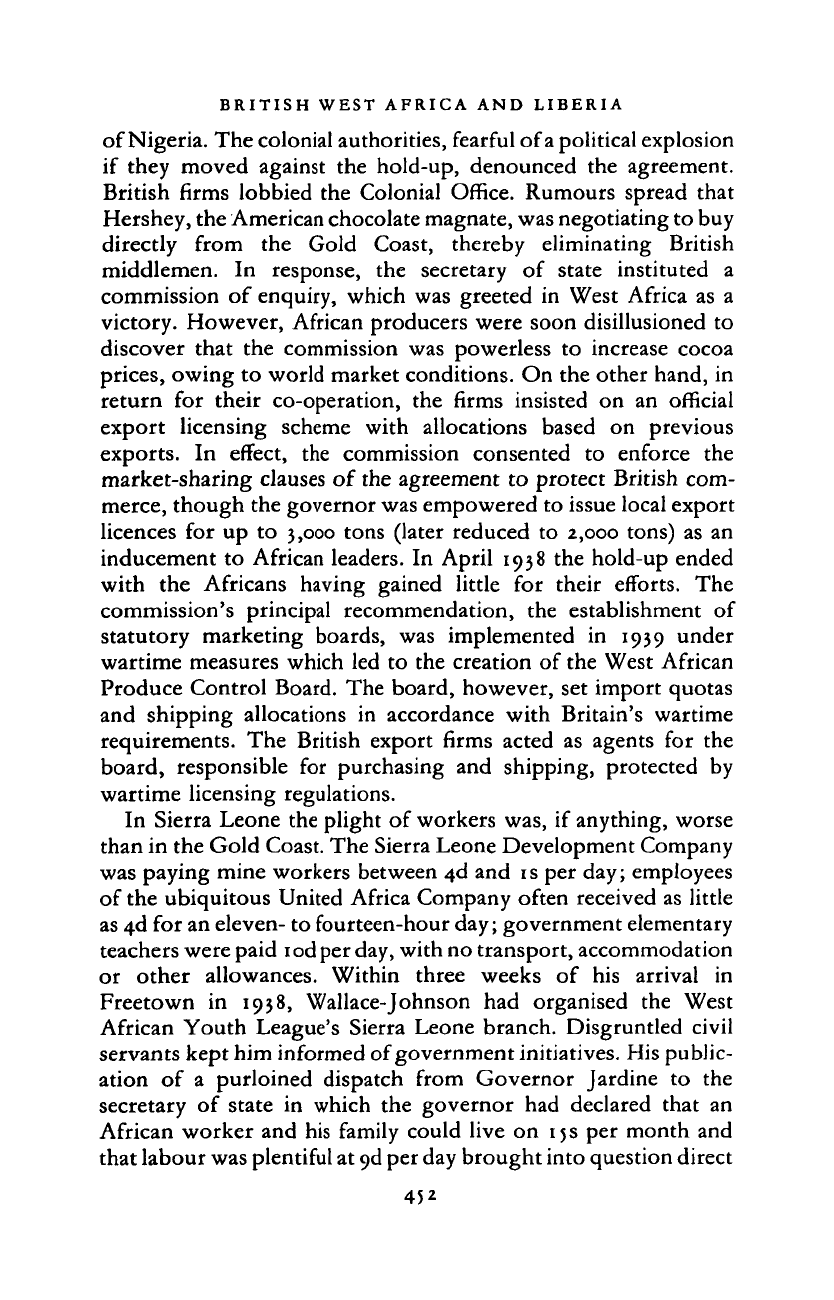
BRITISH WEST AFRICA AND LIBERIA
of Nigeria. The colonial authorities, fearful of
a
political explosion
if they moved against the hold-up, denounced the agreement.
British firms lobbied the Colonial Office. Rumours spread that
Hershey, the American chocolate magnate, was negotiating to buy
directly from
the
Gold Coast, thereby eliminating British
middlemen.
In
response,
the
secretary
of
state instituted
a
commission of enquiry, which was greeted in West Africa as
a
victory. However, African producers were soon disillusioned
to
discover that the commission was powerless
to
increase cocoa
prices, owing to world market conditions. On the other hand, in
return
for
their co-operation, the firms insisted
on an
official
export licensing scheme with allocations based
on
previous
exports.
In
effect,
the
commission consented
to
enforce
the
market-sharing clauses of the agreement to protect British com-
merce, though the governor was empowered to issue local export
licences for up
to
3,000 tons (later reduced
to
2,000 tons) as an
inducement to African leaders. In April 1938 the hold-up ended
with
the
Africans having gained little
for
their efforts.
The
commission's principal recommendation,
the
establishment
of
statutory marketing boards, was implemented
in
1939 under
wartime measures which led to the creation of the West African
Produce Control Board. The board, however, set import quotas
and shipping allocations
in
accordance with Britain's wartime
requirements. The British export firms acted
as
agents
for
the
board, responsible
for
purchasing and shipping, protected
by
wartime licensing regulations.
In Sierra Leone the plight of workers was, if anything, worse
than in the Gold Coast. The Sierra Leone Development Company
was paying mine workers between 46 and is per day; employees
of the ubiquitous United Africa Company often received as little
as 46 for an eleven- to fourteen-hour day; government elementary
teachers were paid iod per
day,
with no transport, accommodation
or other allowances. Within three weeks
of his
arrival
in
Freetown
in
1938, Wallace-Johnson
had
organised
the
West
African Youth League's Sierra Leone branch. Disgruntled civil
servants kept him informed of government initiatives. His public-
ation
of a
purloined dispatch from Governor Jardine
to the
secretary
of
state
in
which the governor had declared that
an
African worker and his family could live on 15s per month and
that labour was plentiful at 9d per day brought into question direct
452
Cambridge Histories Online © Cambridge University Press, 2008
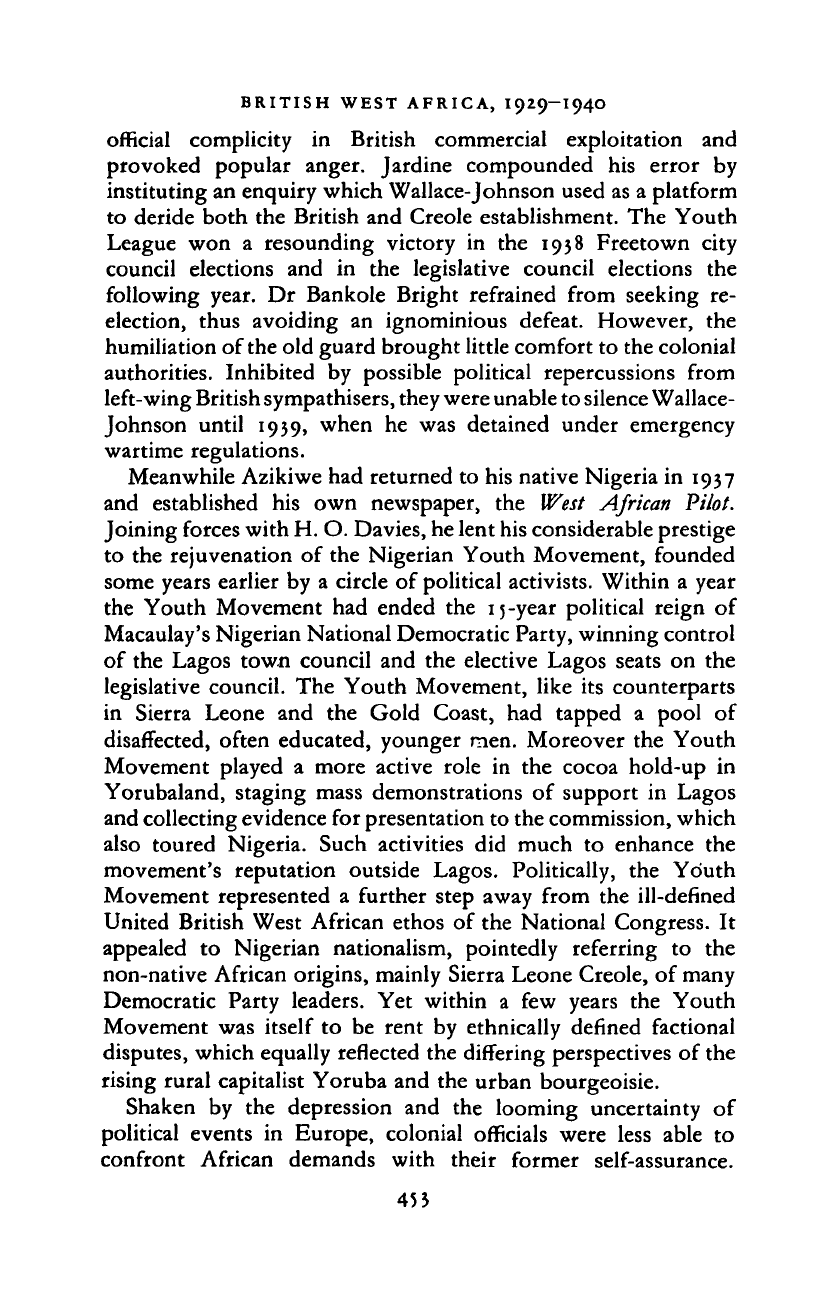
BRITISH WEST AFRICA, 1929-1940
official complicity in British commercial exploitation and
provoked popular anger. Jardine compounded his error by
instituting an enquiry which Wallace-Johnson used as a platform
to deride both the British and Creole establishment. The Youth
League won a resounding victory in the 1938 Freetown city
council elections and in the legislative council elections the
following year. Dr Bankole Bright refrained from seeking re-
election, thus avoiding an ignominious defeat. However, the
humiliation of the old guard brought little comfort to the colonial
authorities. Inhibited by possible political repercussions from
left-wing British sympathisers, they were unable to silence Wallace-
Johnson until 1939, when he was detained under emergency
wartime regulations.
Meanwhile Azikiwe had returned to his native Nigeria in 1937
and established his own newspaper, the West African Pilot.
Joining forces with H. O. Davies, he lent his considerable prestige
to the rejuvenation of the Nigerian Youth Movement, founded
some years earlier by a circle of political activists. Within a year
the Youth Movement had ended the 15-year political reign of
Macaulay's Nigerian National Democratic Party, winning control
of the Lagos town council and the elective Lagos seats on the
legislative council. The Youth Movement, like its counterparts
in Sierra Leone and the Gold Coast, had tapped a pool of
disaffected, often educated, younger men. Moreover the Youth
Movement played a more active role in the cocoa hold-up in
Yorubaland, staging mass demonstrations of support in Lagos
and collecting evidence for presentation to the commission, which
also toured Nigeria. Such activities did much to enhance the
movement's reputation outside Lagos. Politically, the Youth
Movement represented a further step away from the ill-defined
United British West African ethos of the National Congress. It
appealed to Nigerian nationalism, pointedly referring to the
non-native African origins, mainly Sierra Leone Creole, of many
Democratic Party leaders. Yet within a few years the Youth
Movement was itself to be rent by ethnically defined factional
disputes, which equally reflected the differing perspectives of the
rising rural capitalist Yoruba and the urban bourgeoisie.
Shaken by the depression and the looming uncertainty of
political events in Europe, colonial officials were less able to
confront African demands with their former self-assurance.
45 3
Cambridge Histories Online © Cambridge University Press, 2008
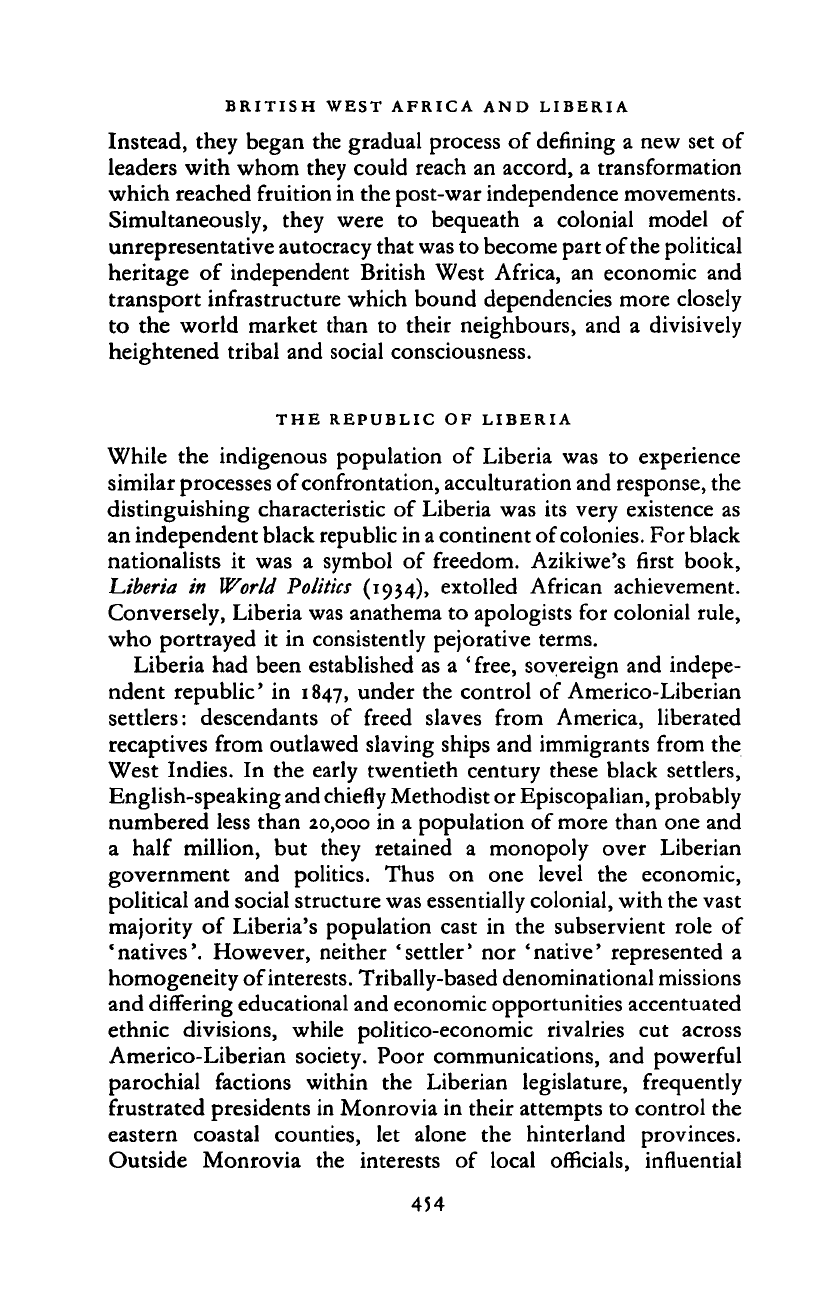
BRITISH WEST AFRICA AND LIBERIA
Instead, they began the gradual process of defining
a
new set of
leaders with whom they could reach an accord, a transformation
which reached fruition in the post-war independence movements.
Simultaneously, they were
to
bequeath
a
colonial model
of
unrepresentative autocracy that was to become part of the political
heritage
of
independent British West Africa,
an
economic and
transport infrastructure which bound dependencies more closely
to the world market than
to
their neighbours, and
a
divisively
heightened tribal and social consciousness.
THE REPUBLIC OF LIBERIA
While the indigenous population
of
Liberia was
to
experience
similar processes of confrontation, acculturation and response, the
distinguishing characteristic of Liberia was its very existence as
an independent black republic in
a
continent of colonies. For black
nationalists
it
was
a
symbol
of
freedom. Azikiwe's first book,
Liberia
in
World
Politics
(1934), extolled African achievement.
Conversely, Liberia was anathema to apologists for colonial rule,
who portrayed
it
in consistently pejorative terms.
Liberia had been established as
a
' free, sovereign and indepe-
ndent republic'
in
1847, under the control of Americo-Liberian
settlers: descendants
of
freed slaves from America, liberated
recaptives from outlawed slaving ships and immigrants from the
West Indies.
In
the early twentieth century these black settlers,
English-speaking and chiefly Methodist or Episcopalian, probably
numbered less than 20,000 in a population of more than one and
a half million,
but
they retained
a
monopoly over Liberian
government
and
politics. Thus
on one
level
the
economic,
political and social structure was essentially colonial, with the vast
majority
of
Liberia's population cast
in
the subservient role
of
'natives'. However, neither 'settler* nor 'native' represented
a
homogeneity of interests. Tribally-based denominational missions
and differing educational and economic opportunities accentuated
ethnic divisions, while politico-economic rivalries
cut
across
Americo-Liberian society. Poor communications, and powerful
parochial factions within
the
Liberian legislature, frequently
frustrated presidents in Monrovia in their attempts to control the
eastern coastal counties,
let
alone
the
hinterland provinces.
Outside Monrovia
the
interests
of
local officials, influential
454
Cambridge Histories Online © Cambridge University Press, 2008
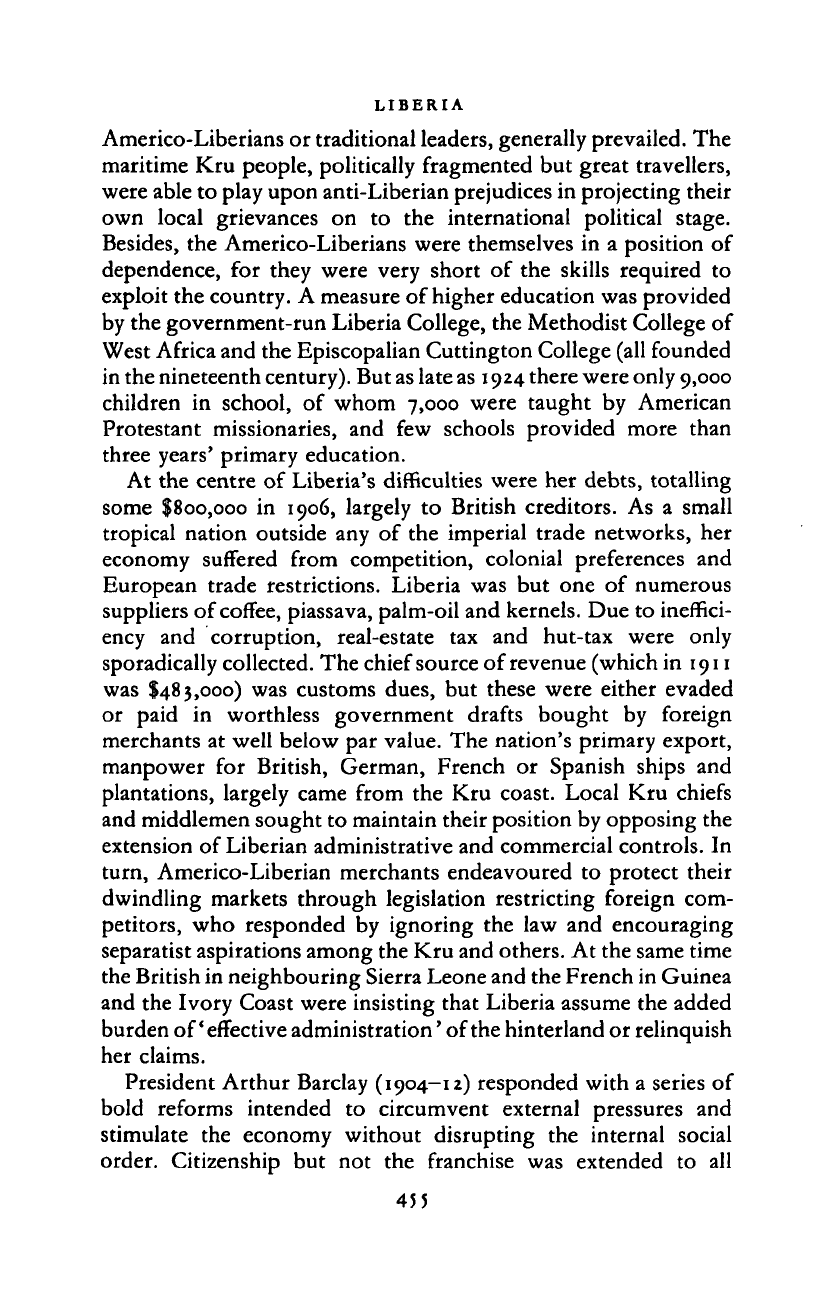
LIBERIA
Americo-Liberians or traditional leaders, generally prevailed. The
maritime Kru people, politically fragmented but great travellers,
were able to play upon anti-Liberian prejudices in projecting their
own local grievances on to the international political stage.
Besides, the Americo-Liberians were themselves in a position of
dependence, for they were very short of the skills required to
exploit the country. A measure of higher education was provided
by the government-run Liberia College, the Methodist College of
West Africa and the Episcopalian Cuttington College (all founded
in the nineteenth
century).
But
as
late
as 1924
there were only
9,000
children in school, of whom
7,000
were taught by American
Protestant missionaries, and few schools provided more than
three years' primary education.
At the centre of Liberia's difficulties were her debts, totalling
some $800,000 in 1906, largely to British creditors. As a small
tropical nation outside any of the imperial trade networks, her
economy suffered from competition, colonial preferences and
European trade restrictions. Liberia was but one of numerous
suppliers of coffee, piassava, palm-oil and kernels. Due to ineffici-
ency and corruption, real-estate tax and hut-tax were only
sporadically collected. The chief source of revenue (which in 1911
was $483,000) was customs dues, but these were either evaded
or paid in worthless government drafts bought by foreign
merchants at well below par value. The nation's primary export,
manpower for British, German, French or Spanish ships and
plantations, largely came from the Kru coast. Local Kru chiefs
and middlemen sought to maintain their position by opposing the
extension of Liberian administrative and commercial controls. In
turn, Americo-Liberian merchants endeavoured to protect their
dwindling markets through legislation restricting foreign com-
petitors, who responded by ignoring the law and encouraging
separatist aspirations among the Kru and others. At the same time
the British in neighbouring Sierra Leone and the French in Guinea
and the Ivory Coast were insisting that Liberia assume the added
burden of' effective administration' of the hinterland or relinquish
her claims.
President Arthur Barclay (1904-12) responded with a series of
bold reforms intended to circumvent external pressures and
stimulate the economy without disrupting the internal social
order. Citizenship but not the franchise was extended to all
455
Cambridge Histories Online © Cambridge University Press, 2008
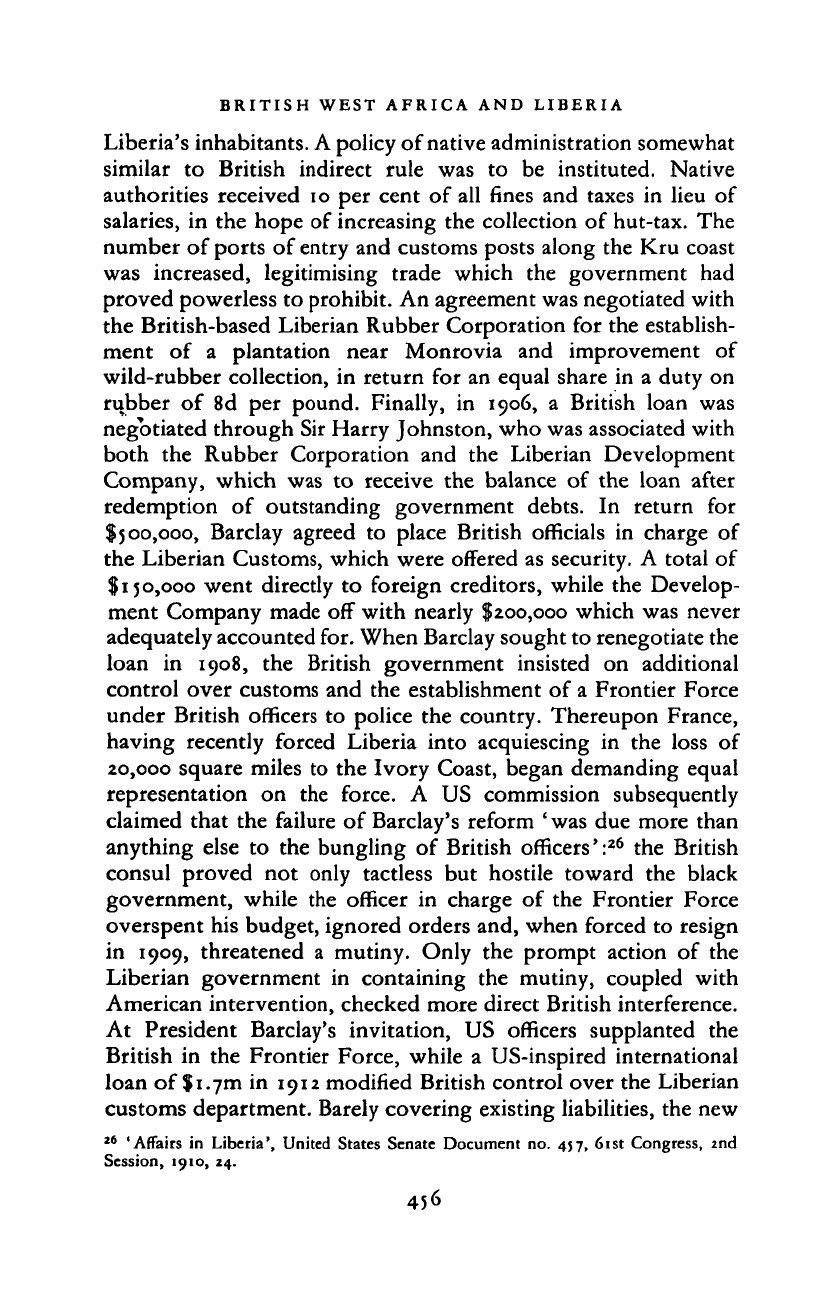
BRITISH WEST AFRICA AND LIBERIA
Liberia's inhabitants. A policy of native administration somewhat
similar
to
British indirect rule
was to be
instituted. Native
authorities received
io per
cent
of
all fines
and
taxes
in
lieu
of
salaries,
in the
hope
of
increasing
the
collection
of
hut-tax.
The
number
of
ports
of
entry
and
customs posts along
the Kru
coast
was increased, legitimising trade which
the
government
had
proved powerless
to
prohibit.
An
agreement was negotiated with
the British-based Liberian Rubber Corporation
for the
establish-
ment
of a
plantation near Monrovia
and
improvement
of
wild-rubber collection,
in
return
for an
equal share
in a
duty
on
rubber
of 8d per
pound. Finally,
in 1906, a
British loan
was
negotiated through Sir Harry Johnston, who was associated with
both
the
Rubber Corporation
and the
Liberian Development
Company, which
was to
receive
the
balance
of the
loan after
redemption
of
outstanding government debts.
In
return
for
$500,000, Barclay agreed
to
place British officials
in
charge
of
the Liberian Customs, which were offered
as
security.
A
total
of
$150,000 went directly
to
foreign creditors, while
the
Develop-
ment Company made
off
with nearly $200,000 which
was
never
adequately accounted for. When Barclay sought to renegotiate the
loan
in 1908, the
British government insisted
on
additional
control over customs
and the
establishment
of a
Frontier Force
under British officers
to
police
the
country. Thereupon France,
having recently forced Liberia into acquiescing
in the
loss
of
20,000 square miles
to the
Ivory Coast, began demanding equal
representation
on the
force.
A US
commission subsequently
claimed that
the
failure
of
Barclay's reform '
was
due
more than
anything else
to the
bungling
of
British officers'
:
26
the
British
consul proved
not
only tactless
but
hostile toward
the
black
government, while
the
officer
in
charge
of the
Frontier Force
overspent his budget, ignored orders and, when forced
to
resign
in
1909,
threatened
a
mutiny. Only
the
prompt action
of the
Liberian government
in
containing
the
mutiny, coupled with
American intervention, checked more direct British interference.
At President Barclay's invitation,
US
officers supplanted
the
British
in the
Frontier Force, while
a
US-inspired international
loan
of
$ 1.7m
in
1912 modified British control over
the
Liberian
customs department. Barely covering existing liabilities,
the
new
26
'Affairs
in
Liberia', United States Senate Document
no. 457, 61st
Congress,
2nd
Session, 1910,
24.
456
Cambridge Histories Online © Cambridge University Press, 2008
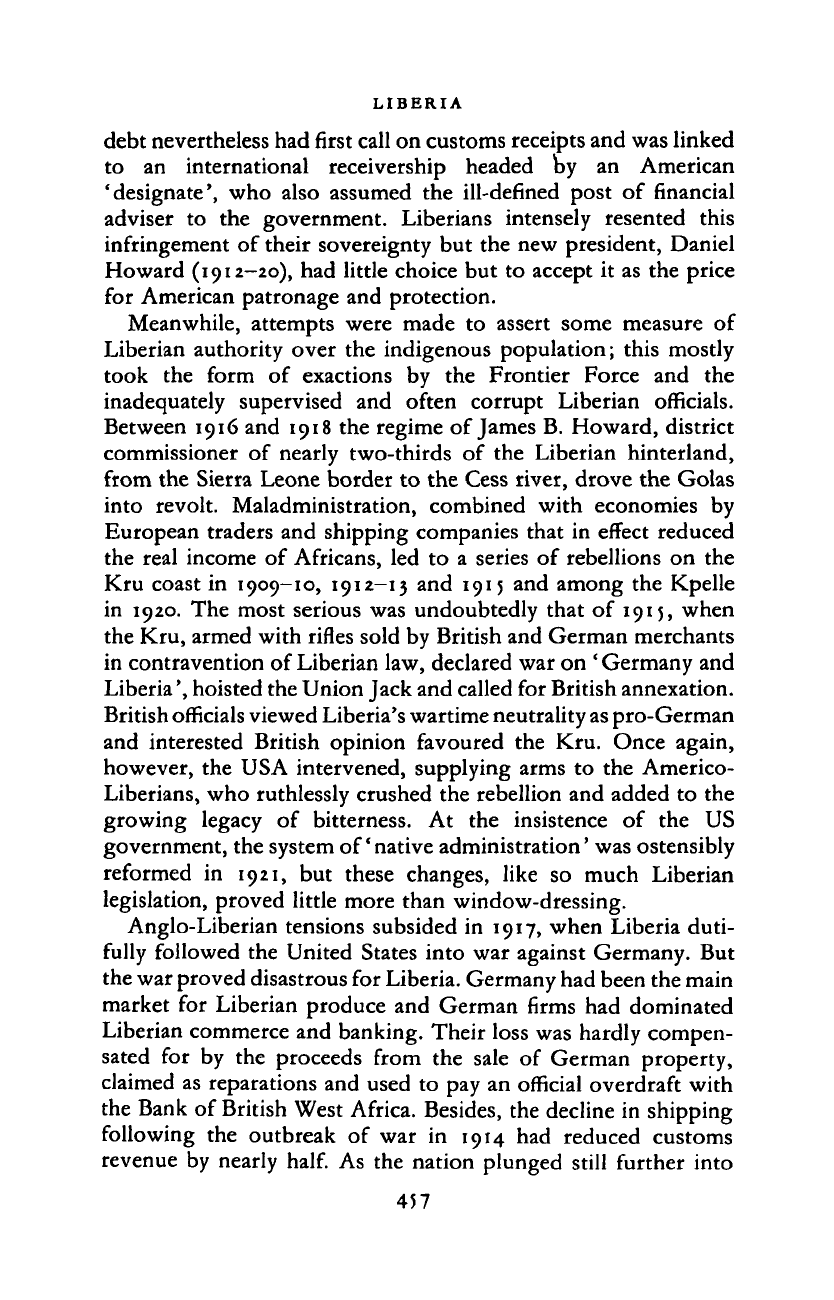
LIBERIA
debt nevertheless had first call on customs receipts and was linked
to an international receivership headed by an American
'designate', who also assumed the ill-defined post of financial
adviser to the government. Liberians intensely resented this
infringement of their sovereignty but the new president, Daniel
Howard (1912-20), had little choice but to accept it as the price
for American patronage and protection.
Meanwhile, attempts were made to assert some measure of
Liberian authority over the indigenous population; this mostly
took the form of exactions by the Frontier Force and the
inadequately supervised and often corrupt Liberian officials.
Between 1916 and 1918 the regime of James B. Howard, district
commissioner of nearly two-thirds of the Liberian hinterland,
from the Sierra Leone border to the Cess river, drove the Golas
into revolt. Maladministration, combined with economies by
European traders and shipping companies that in effect reduced
the real income of Africans, led to a series of rebellions on the
Kru coast in 1909-10, 1912-13 and 1915 and among the Kpelle
in 1920. The most serious was undoubtedly that of 1915, when
the Kru, armed with rifles sold by British and German merchants
in contravention of Liberian law, declared war on ' Germany and
Liberia', hoisted the Union Jack and called for British annexation.
British officials viewed Liberia's wartime neutrality
as
pro-German
and interested British opinion favoured the Kru. Once again,
however, the USA intervened, supplying arms to the Americo-
Liberians, who ruthlessly crushed the rebellion and added to the
growing legacy of bitterness. At the insistence of the US
government, the system of' native administration' was ostensibly
reformed in 1921, but these changes, like so much Liberian
legislation, proved little more than window-dressing.
Anglo-Liberian tensions subsided in 1917, when Liberia duti-
fully followed the United States into war against Germany. But
the war proved disastrous for Liberia. Germany had been the main
market for Liberian produce and German firms had dominated
Liberian commerce and banking. Their loss was hardly compen-
sated for by the proceeds from the sale of German property,
claimed as reparations and used to pay an official overdraft with
the Bank of British West Africa. Besides, the decline in shipping
following the outbreak of war in 1914 had reduced customs
revenue by nearly
half.
As the nation plunged still further into
457
Cambridge Histories Online © Cambridge University Press, 2008
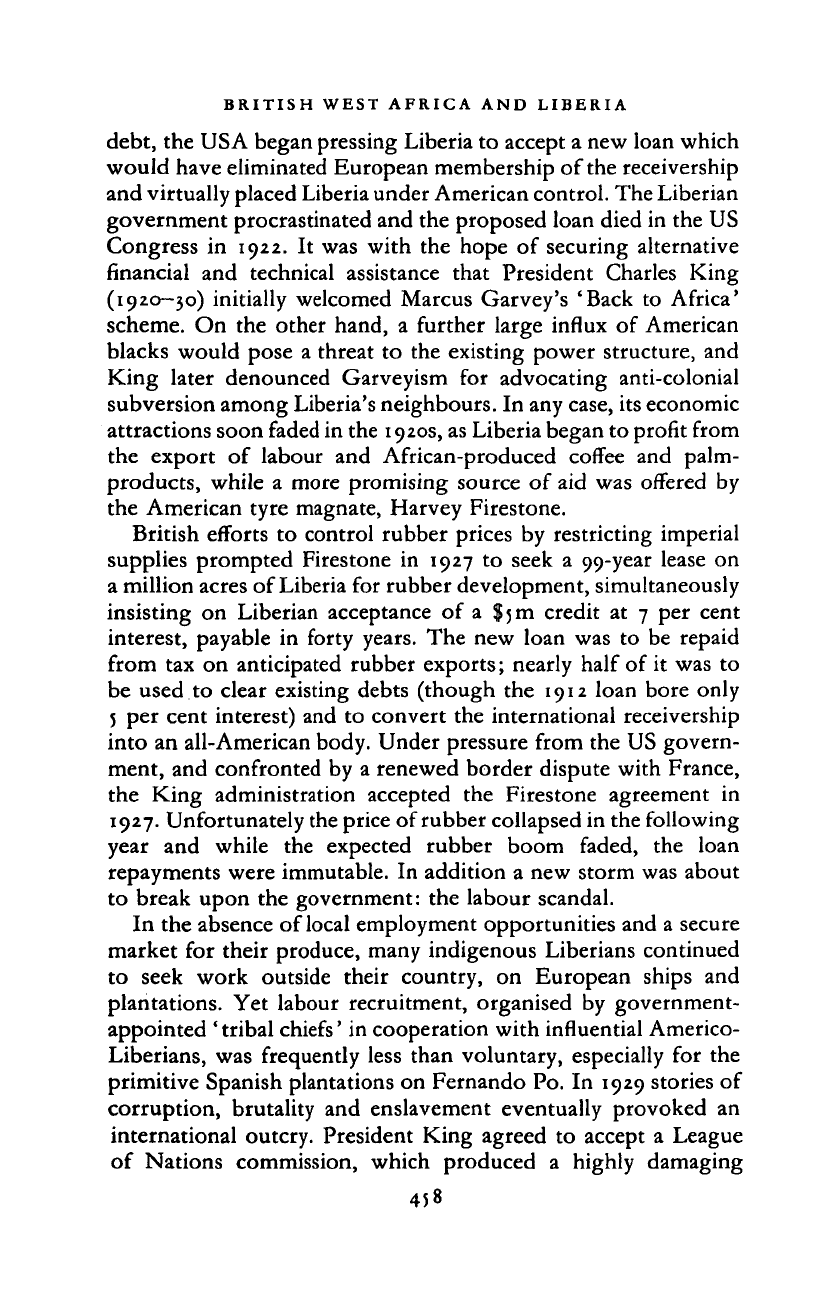
BRITISH WEST AFRICA AND LIBERIA
debt, the USA began pressing Liberia to accept a new loan which
would have eliminated European membership of the receivership
and virtually placed Liberia under American control. The Liberian
government procrastinated and the proposed loan died in the US
Congress
in
1922.
It
was with the hope
of
securing alternative
financial and technical assistance that President Charles King
(1920-30) initially welcomed Marcus Garvey's 'Back to Africa'
scheme. On the other hand,
a
further large influx
of
American
blacks would pose a threat to the existing power structure, and
King later denounced Garveyism
for
advocating anti-colonial
subversion among Liberia's neighbours. In any case, its economic
attractions soon faded in the 1920s, as Liberia began to profit from
the export
of
labour and African-produced coffee and palm-
products, while
a
more promising source of aid was offered by
the American tyre magnate, Harvey Firestone.
British efforts to control rubber prices by restricting imperial
supplies prompted Firestone
in
1927
to
seek
a
99-year lease on
a million acres of Liberia for rubber development, simultaneously
insisting
on
Liberian acceptance
of
a $jm credit
at 7
per cent
interest, payable
in
forty years. The new loan was
to
be repaid
from tax on anticipated rubber exports; nearly half of it was
to
be used to clear existing debts (though the 1912 loan bore only
5 per cent interest) and to convert the international receivership
into an ail-American body. Under pressure from the US govern-
ment, and confronted by a renewed border dispute with France,
the King administration accepted the Firestone agreement
in
1927.
Unfortunately the price of rubber collapsed in the following
year
and
while
the
expected rubber boom faded,
the
loan
repayments were immutable. In addition a new storm was about
to break upon the government: the labour scandal.
In the absence of
local
employment opportunities and a secure
market for their produce, many indigenous Liberians continued
to seek work outside their country,
on
European ships and
plantations. Yet labour recruitment, organised by government-
appointed 'tribal chiefs' in cooperation with influential Americo-
Liberians, was frequently less than voluntary, especially for the
primitive Spanish plantations on Fernando Po. In 1929 stories of
corruption, brutality and enslavement eventually provoked
an
international outcry. President King agreed
to
accept
a
League
of Nations commission, which produced
a
highly damaging
458
Cambridge Histories Online © Cambridge University Press, 2008
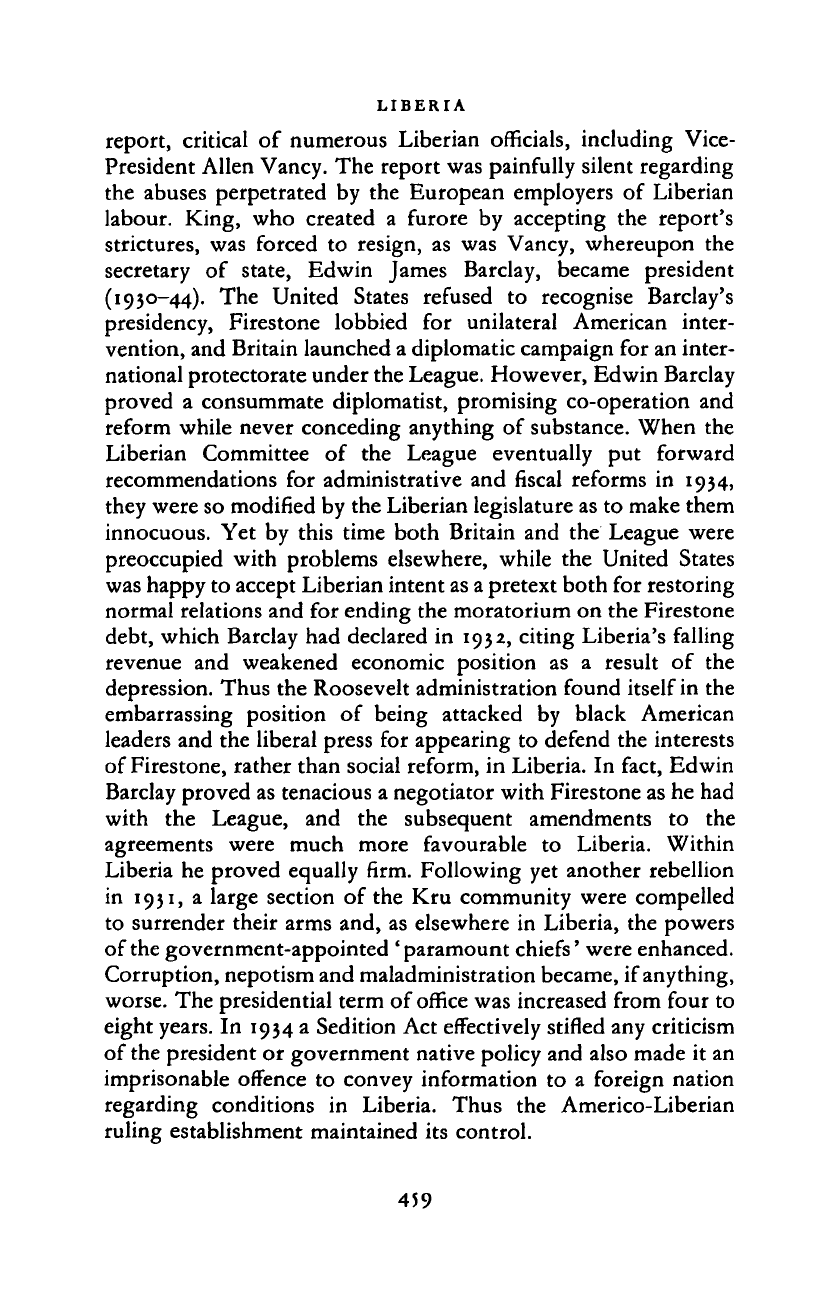
LIBERIA
report, critical of numerous Liberian officials, including Vice-
President Allen Vancy. The report was painfully silent regarding
the abuses perpetrated by the European employers of Liberian
labour. King, who created a furore by accepting the report's
strictures, was forced to resign, as was Vancy, whereupon the
secretary of state, Edwin James Barclay, became president
(1930-44). The United States refused to recognise Barclay's
presidency, Firestone lobbied for unilateral American inter-
vention, and Britain launched a diplomatic campaign for an inter-
national protectorate under the League. However, Edwin Barclay
proved a consummate diplomatist, promising co-operation and
reform while never conceding anything of substance. When the
Liberian Committee of the League eventually put forward
recommendations for administrative and fiscal reforms in 1934,
they were so modified by the Liberian legislature as to make them
innocuous. Yet by this time both Britain and the League were
preoccupied with problems elsewhere, while the United States
was happy to accept Liberian intent as
a
pretext both for restoring
normal relations and for ending the moratorium on the Firestone
debt, which Barclay had declared in 1932, citing Liberia's falling
revenue and weakened economic position as a result of the
depression. Thus the Roosevelt administration found itself in the
embarrassing position of being attacked by black American
leaders and the liberal press for appearing to defend the interests
of
Firestone,
rather than social reform, in Liberia. In fact, Edwin
Barclay proved as tenacious a negotiator with Firestone as he had
with the League, and the subsequent amendments to the
agreements were much more favourable to Liberia. Within
Liberia he proved equally firm. Following yet another rebellion
in 1931, a large section of the Kru community were compelled
to surrender their arms and, as elsewhere in Liberia, the powers
of the government-appointed 'paramount chiefs' were enhanced.
Corruption, nepotism and maladministration became, if anything,
worse. The presidential term of office was increased from four to
eight years. In 1934 a Sedition Act effectively stifled any criticism
of the president or government native policy and also made it an
imprisonable offence to convey information to a foreign nation
regarding conditions in Liberia. Thus the Americo-Liberian
ruling establishment maintained its control.
459
Cambridge Histories Online © Cambridge University Press, 2008
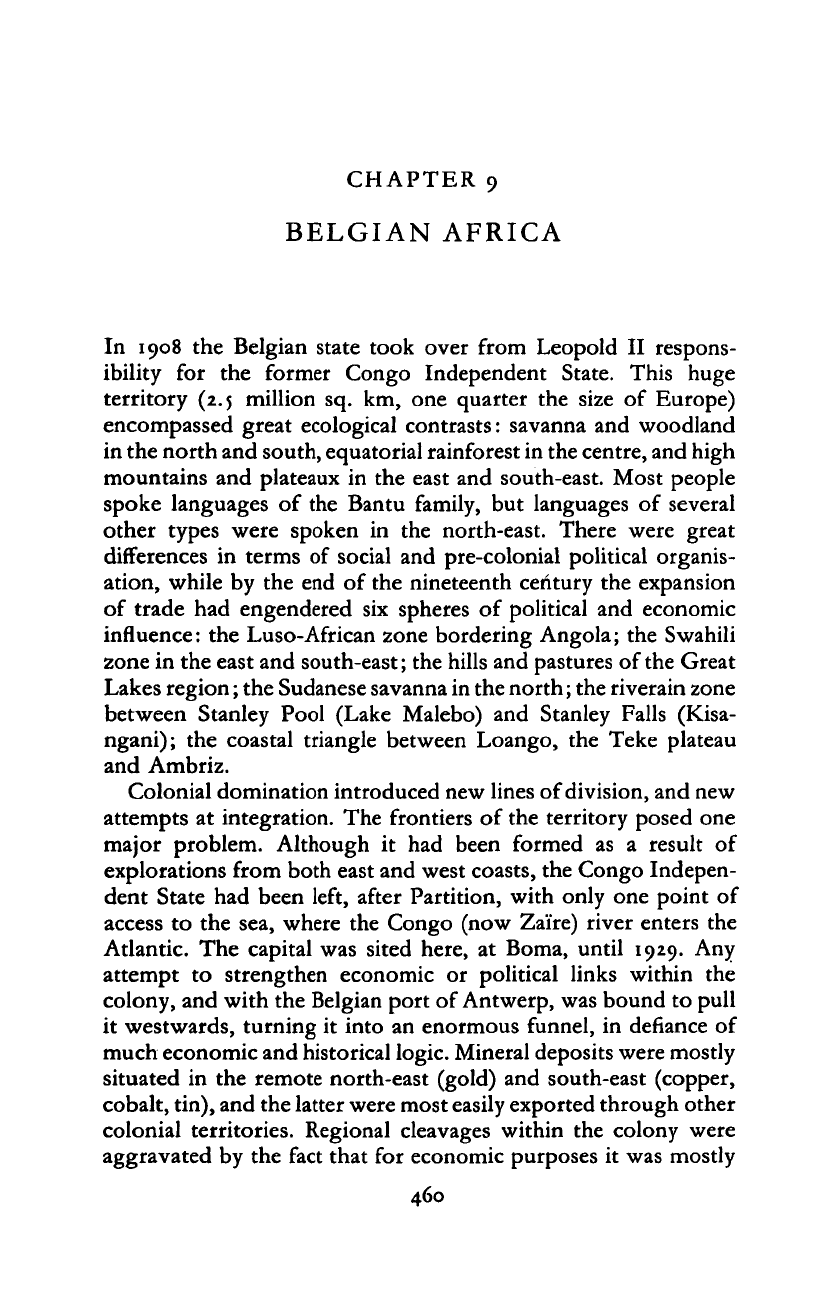
CHAPTER
9
BELGIAN AFRICA
In 1908 the Belgian state took over from Leopold II respons-
ibility for the former Congo Independent State. This huge
territory (2.5 million sq. km, one quarter the size of Europe)
encompassed great ecological contrasts: savanna and woodland
in the north and south, equatorial rainforest in the centre, and high
mountains and plateaux in the east and south-east. Most people
spoke languages of the Bantu family, but languages of several
other types were spoken in the north-east. There were great
differences in terms of social and pre-colonial political organis-
ation, while by the end of the nineteenth century the expansion
of trade had engendered six spheres of political and economic
influence: the Luso-African zone bordering Angola; the Swahili
zone in the east and south-east; the hills and pastures of the Great
Lakes region; the Sudanese savanna in the north; the riverain zone
between Stanley Pool (Lake Malebo) and Stanley Falls (Kisa-
ngani);
the coastal triangle between Loango, the Teke plateau
and Ambriz.
Colonial domination introduced new lines of division, and new
attempts at integration. The frontiers of the territory posed one
major problem. Although it had been formed as a result of
explorations from both east and west coasts, the Congo Indepen-
dent State had been left, after Partition, with only one point of
access to the sea, where the Congo (now Zaire) river enters the
Atlantic. The capital was sited here, at Boma, until 1929. Any
attempt to strengthen economic or political links within the
colony, and with the Belgian port of Antwerp, was bound to pull
it westwards, turning it into an enormous funnel, in defiance of
much economic and historical logic. Mineral deposits were mostly
situated in the remote north-east (gold) and south-east (copper,
cobalt, tin), and the latter were most easily exported through other
colonial territories. Regional cleavages within the colony were
aggravated by the fact that for economic purposes it was mostly
460
Cambridge Histories Online © Cambridge University Press, 2008
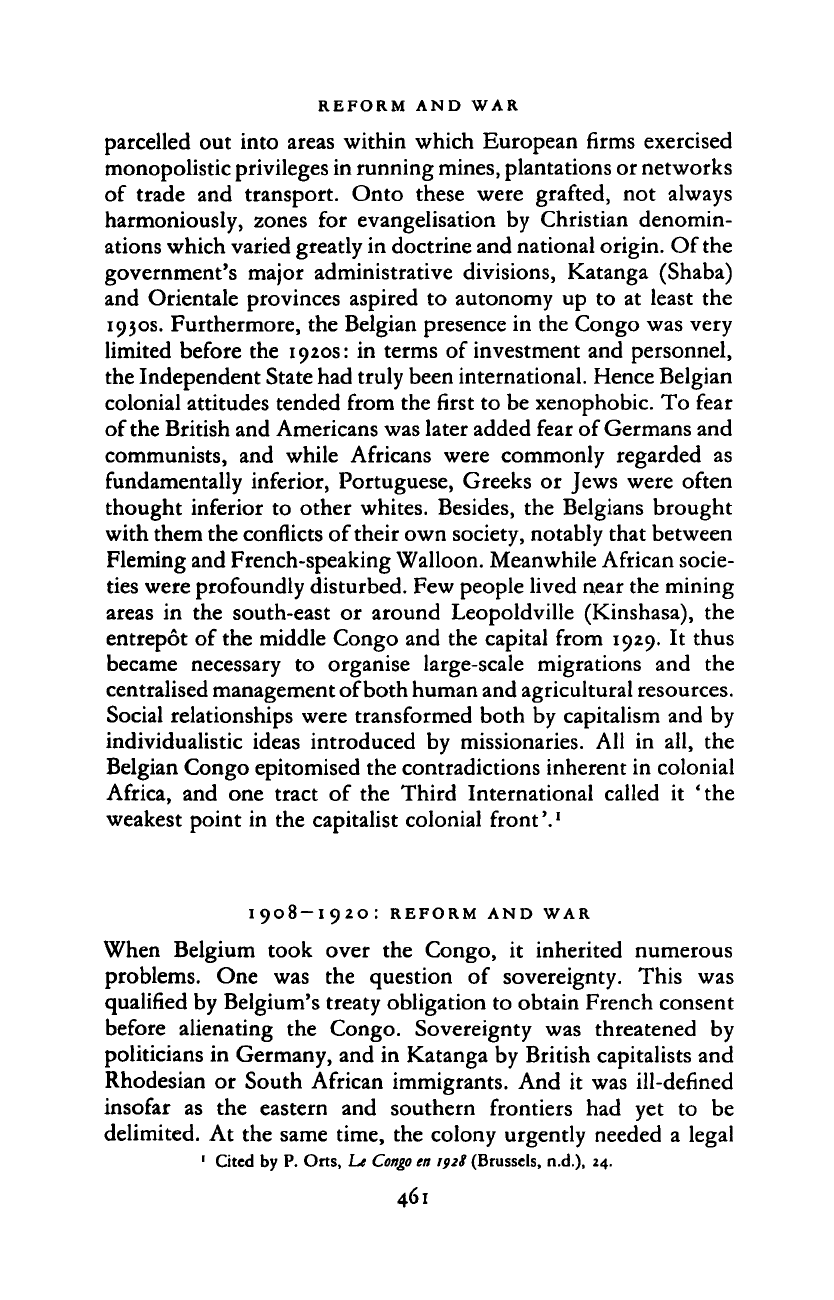
REFORM AND WAR
parcelled out into areas within which European firms exercised
monopolistic privileges in running
mines,
plantations or networks
of trade and transport. Onto these were grafted, not always
harmoniously, zones for evangelisation by Christian denomin-
ations which varied greatly in doctrine and national origin. Of the
government's major administrative divisions, Katanga (Shaba)
and Orientale provinces aspired to autonomy up to at least the
1930s. Furthermore, the Belgian presence in the Congo was very
limited before the 1920s: in terms of investment and personnel,
the Independent State had truly been international. Hence Belgian
colonial attitudes tended from the first to be xenophobic. To fear
of the British and Americans was later added fear of Germans and
communists, and while Africans were commonly regarded as
fundamentally inferior, Portuguese, Greeks or Jews were often
thought inferior to other whites. Besides, the Belgians brought
with them the conflicts of their own society, notably that between
Fleming and French-speaking Walloon. Meanwhile African socie-
ties were profoundly disturbed. Few people lived near the mining
areas in the south-east or around Leopoldville (Kinshasa), the
entrepot of the middle Congo and the capital from 1929. It thus
became necessary to organise large-scale migrations and the
centralised management of both human and agricultural resources.
Social relationships were transformed both by capitalism and by
individualistic ideas introduced by missionaries. All in all, the
Belgian Congo epitomised the contradictions inherent in colonial
Africa, and one tract of the Third International called it 'the
weakest point in the capitalist colonial front'.
1
1908-1920: REFORM AND WAR
When Belgium took over the Congo, it inherited numerous
problems. One was the question of sovereignty. This was
qualified by Belgium's treaty obligation to obtain French consent
before alienating the Congo. Sovereignty was threatened by
politicians in Germany, and in Katanga by British capitalists and
Rhodesian or South African immigrants. And it was ill-defined
insofar as the eastern and southern frontiers had yet to be
delimited. At the same time, the colony urgently needed a legal
1
Cited by P. Orts, Le
Congo
en 1928 (Brussels, n.d.), 24.
461
Cambridge Histories Online © Cambridge University Press, 2008
